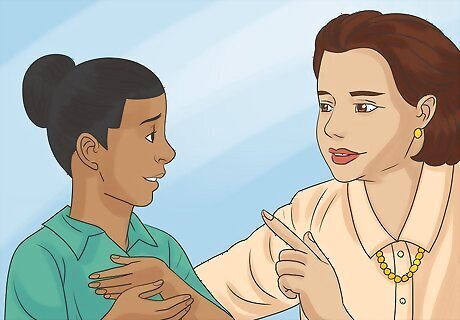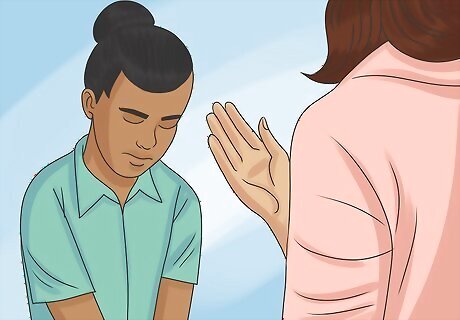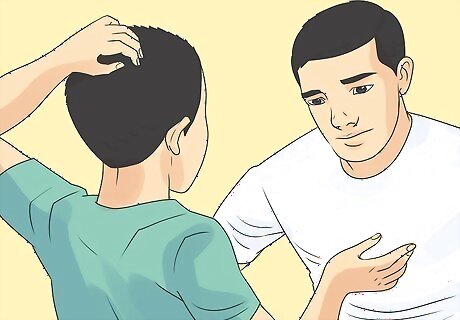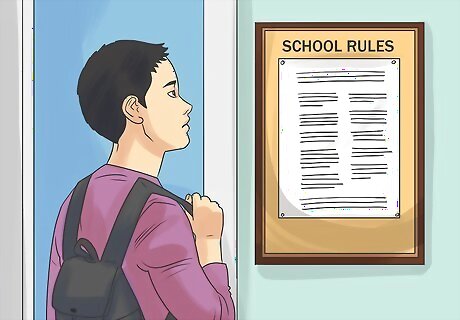
views
Evaluating the Severity of Your Situation

Forgive yourself for minor offenses. If you’ve done something small like forgetting your pencil in class or getting caught with a snack, you have little to worry about. Simply do as your teacher asks to fix the problem and then move on. There is no need to fixate on the problem and make yourself worried and distracted from the rest of the class. For example, you might tell yourself something like “Everyone makes mistakes. I’ll do better next time.” Keep in mind that repeatedly doing small things might lead you to be in more trouble than if you just do it once. If you continue to worry, you’ll be distracted and more likely to get into trouble again.

Avoid compounding the situation. You might feel like you can lie your way out of the situation, but that rarely works. You are far better off to own up to your actions and accept responsibility. This way, your teachers are more likely to think that you are taking the situation seriously and will respect you more.

Try to recall anyone else that committed the same offense. You may have gotten caught breaking a rule, and now your mind has gone straight to the worst possible scenario. Instead, think about anyone else in the school that has done something similar. Try to remember what their punishment was like, or if they had one at all. This will be a good indicator as to what kind of trouble you are in.

See the big picture. Even if you get in trouble a time or two, your life isn’t over. Avoid the urge to create a doomsday scenario in your mind. You will still be able to graduate, have a good career, and lead a happy life.
Seeking Forgiveness

Apologize for getting into trouble. The first step to getting out of trouble is to acknowledge you did something wrong. Apologize to the teacher or other disciplinarian for what you have done. This will go a long way toward easing the consequences. For example, you might say to your teacher “I’m sorry that I fell asleep in class today. It won’t happen again.”

Offer to correct the mistake. Apologizing is a good first step, but it does not correct your mistake. Offer a suggestion as to how you could fix the situation. Be ready for your teacher to change your idea a bit. If you are willing to compromise, you might be able to move past the incident without getting into much trouble. Given the example of falling asleep in class, you could suggest to your teacher that you will get to bed earlier so that you aren’t so tired.

Accept the punishment. Whether you are truly sorry or not, you might still have to face consequences. As long as these consequences are fair and within reason, accept them without complaint. This will show that you do truly want to fix the situation. Do not be combative, even if you feel the consequences are much too severe for your actions. If you feel that you were treated unjustly, talk to your parents or the school counselor/principal.
Staying Out of Trouble

Realize that there are consequences for breaking rules. It is no secret to you that your school has a lot of rules. Whether you agree with them or not, they are still expected to be followed. Before doing something that could get you into trouble, think through the situation and decide if the risk is worth the consequences if you get caught.

Make an effort to do your work. A common complaint amongst teachers is that students do not attempt to do their work. This leads to a defiant and ineffective classroom and a frustrated teacher. If you want to stay on the teacher’s good side, complete all of your assignments on time and turn them in. For example, if you have a book report due, get it done on time (or early) instead of asking to turn it in late.

Make a plan for how to keep this from happening again. This might mean asking for help if you need it, having hard conversations, or tackling things even if they're boring, hard, or stressful. Just don't avoid the problem—that's only going to make it worse in the long run.

Follow school policies. All schools have policies in place. Common ones include things like tobacco bans, bans on weapons, dress codes, or attendance policies. These policies must be followed by each and every student. If you fail to follow these polices, you will get into trouble. For example, if you bring alcohol onto school grounds, you will certainly get in trouble.

Get along with other students. Conflict with other students can lead to trouble. Whether it escalates to a physical fight or simply causes class disruptions, these conflicts are not amusing for your teachers. If you make an effort to get along with your fellow students, you can avoid these conflicts entirely.


















Comments
0 comment